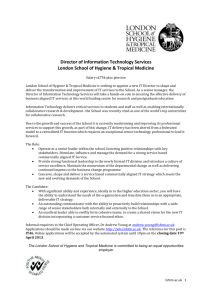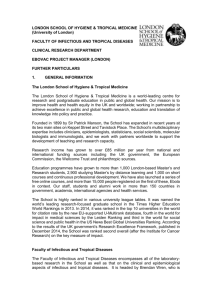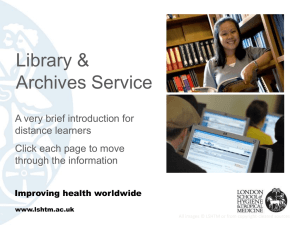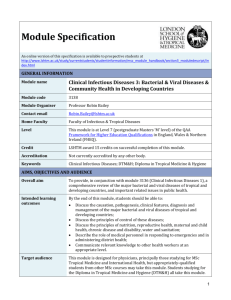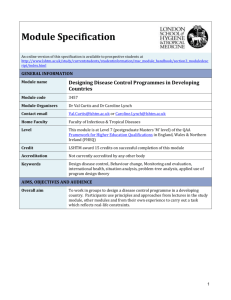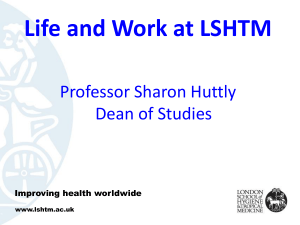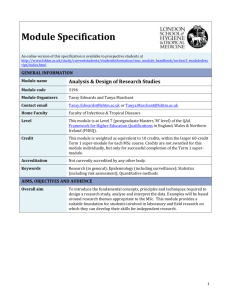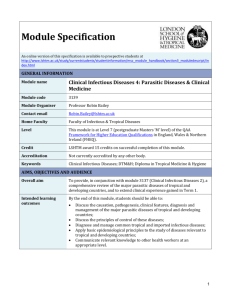Job Description - Jobs at LSHTM
advertisement
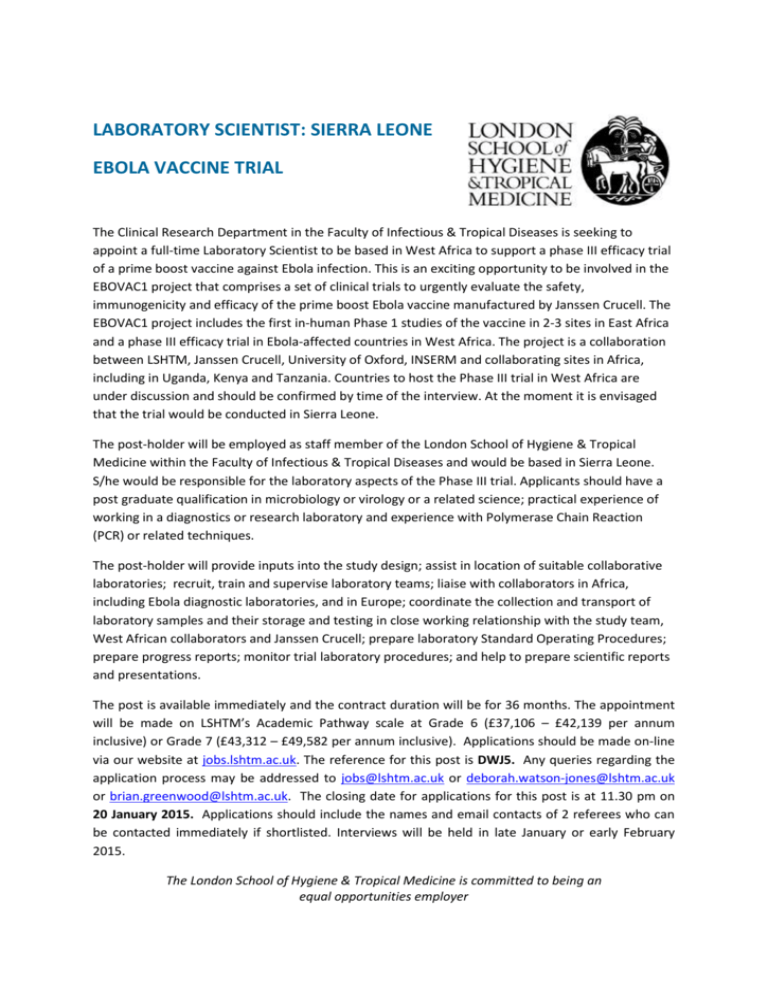
LABORATORY SCIENTIST: SIERRA LEONE EBOLA VACCINE TRIAL The Clinical Research Department in the Faculty of Infectious & Tropical Diseases is seeking to appoint a full-time Laboratory Scientist to be based in West Africa to support a phase III efficacy trial of a prime boost vaccine against Ebola infection. This is an exciting opportunity to be involved in the EBOVAC1 project that comprises a set of clinical trials to urgently evaluate the safety, immunogenicity and efficacy of the prime boost Ebola vaccine manufactured by Janssen Crucell. The EBOVAC1 project includes the first in-human Phase 1 studies of the vaccine in 2-3 sites in East Africa and a phase III efficacy trial in Ebola-affected countries in West Africa. The project is a collaboration between LSHTM, Janssen Crucell, University of Oxford, INSERM and collaborating sites in Africa, including in Uganda, Kenya and Tanzania. Countries to host the Phase III trial in West Africa are under discussion and should be confirmed by time of the interview. At the moment it is envisaged that the trial would be conducted in Sierra Leone. The post-holder will be employed as staff member of the London School of Hygiene & Tropical Medicine within the Faculty of Infectious & Tropical Diseases and would be based in Sierra Leone. S/he would be responsible for the laboratory aspects of the Phase III trial. Applicants should have a post graduate qualification in microbiology or virology or a related science; practical experience of working in a diagnostics or research laboratory and experience with Polymerase Chain Reaction (PCR) or related techniques. The post-holder will provide inputs into the study design; assist in location of suitable collaborative laboratories; recruit, train and supervise laboratory teams; liaise with collaborators in Africa, including Ebola diagnostic laboratories, and in Europe; coordinate the collection and transport of laboratory samples and their storage and testing in close working relationship with the study team, West African collaborators and Janssen Crucell; prepare laboratory Standard Operating Procedures; prepare progress reports; monitor trial laboratory procedures; and help to prepare scientific reports and presentations. The post is available immediately and the contract duration will be for 36 months. The appointment will be made on LSHTM’s Academic Pathway scale at Grade 6 (£37,106 – £42,139 per annum inclusive) or Grade 7 (£43,312 – £49,582 per annum inclusive). Applications should be made on-line via our website at jobs.lshtm.ac.uk. The reference for this post is DWJ5. Any queries regarding the application process may be addressed to jobs@lshtm.ac.uk or deborah.watson-jones@lshtm.ac.uk or brian.greenwood@lshtm.ac.uk. The closing date for applications for this post is at 11.30 pm on 20 January 2015. Applications should include the names and email contacts of 2 referees who can be contacted immediately if shortlisted. Interviews will be held in late January or early February 2015. The London School of Hygiene & Tropical Medicine is committed to being an equal opportunities employer FURTHER PARTICULARS THE SCHOOL The London School of Hygiene & Tropical Medicine is one of Europe’s leading schools of Public Health and a leading postgraduate institution worldwide for research and postgraduate education in global health. Part of the University of London, the London School is the largest institution of its kind in Europe with a remarkable depth and breadth of expertise encompassing many disciplines. The School was ranked one of the top 10 research institutions in the country in the recent Times Higher Education’s 'table of excellence' . In 2009, the School became the first UK institution to win the Gates Award for Global Health. The School’s environment is a rich multicultural one: there are around 3500 students from 100+ countries following 24 taught masters courses delivered either in London or through distance learning, and about 400 undertaking a research degree. Over 40% of these students are from nonEuropean countries. Alumni are working in more than 180 countries. The School has about 1600 staff drawn from over 74 nationalities. There are research collaborations with over 100 countries throughout the world, utilizing our critical mass of multidisciplinary expertise which includes clinicians, epidemiologists, statisticians, social scientists, economists, molecular biologists, immunologists, ophthalmologists, anthropologists, virologists, pharmacologists and nutritionists. At any one time around 100 School staff are based overseas, particularly in Africa and Asia. We have a strong commitment to partnership with institutions in low and middle income countries to support the development of teaching and research capacity. The School has expanded greatly in recent years. Its research funding now exceeds £67M per annum, much of it from highly competitive national and international sources. The commitment of staff to methodological rigour, innovative thinking and policy relevance will ensure that the School continues to occupy a leadership position in national and global health, adapting quickly to new challenges and opportunities. Mission To improve health and health equity in the UK and worldwide; working in partnership to achieve excellence in public and global health research, education and translation of knowledge into policy and practice. THE FACULTY The Faculty of Infectious and Tropical Diseases encompasses all of the laboratory-based research in the School as well as that on the clinical and epidemiological aspects of infectious and tropical diseases. It is headed by Brendan Wren, who is Professor of Microbial Pathogenesis. The range of disciplines represented in the faculty is very broad and inter-disciplinary research is a feature of much of our activity. The spectrum of diseases studied is wide and there are major research groups with a focus on malaria, tuberculosis, HIV/AIDS and other sexually transmitted diseases, vaccine development and evaluation, and vector biology and disease control. The Faculty is organised into four large research departments comprising: Pathogen Molecular Biology, Immunology and Infection, Disease Control, and Clinical Research. There is close interaction between scientists in different research teams. The Faculty has strong overseas links, which provide a basis for field studies and international collaborations in developed and developing countries. The teaching programme includes MSc courses, taught in-house and by distance learning, which are modular in structure, a variety of short-courses and an active doctoral programme (PhD and DrPH). For further information on the Faculty see: http://www.lshtm.ac.uk/itd/index.html. THE DEPARTMENT The Department of Clinical Research addresses infectious diseases of major public health importance in developing countries. Professor Philippe Mayaud is the Head of Department. Activities include trials of new therapies, vaccines and educational interventions; the development and evaluation of new diagnostic tests; studies investigating the immunological and molecular correlates of pathogenesis and protective immunity, and genetic polymorphisms conferring protection or susceptibility to infectious diseases; health services research which aims to identify the most efficient and cost-effective way to deliver health care; and health policy analysis. JOB DESCRIPTION Post: Laboratory Scientist Responsible to: Dr Deborah Watson-Jones Grade: Research Fellow/ Lecturer, full-time for 36 months (based in Sierra Leone) Key Responsibilities for Post Holder 1. Day-to-day coordination of the laboratory activities of the phase III trial for the EBOVAC 1 project including liaison with Ebola diagnostic laboratories in-country. 2. Assisting in selection of research partners, collaborating laboratories and study sites incountry. 3. Day-to-day supervision of laboratory activities required for the Phase III trial, including pregnancy testing and assays for the investigation of adverse events, ensuring these are performed according to the trial protocol and results fed back to the clinical team in a timely fashion. 4. Liaising with the other collaborating Janssen laboratories, ensuring that samples are sent to these laboratories according to schedule and protocol shipping requirements. 5. Acting as the main Phase III trial laboratory contact person for communication with the field laboratories and central laboratories in West Africa, LSHTM and the other partners involved in the project, including Janssen Crucell, INSERM and Ministries of Health, and with laboratory teams from other organisations implementing other phase III Ebola Vaccine trials in-country. 6. Ensuring that all necessary research and ethics clearances are obtained and that all necessary reports are submitted to relevant research and ethics authorities as required. 7. Recruiting, training and supervising field team staff and management of trial laboratories to ensure that the trial is conducted to GCP and international trial standards. 8. Development of Standard Operating Procedures for laboratory activities related to the Ebola Vaccine Phase III trial. 9. Drafting, editing and reviewing laboratory reports and ensuring that these are submitted to the trial partners as required. This will include, but not be limited to, preparation of a weekly written report of study progress to be shared with the Ebola Vaccine Phase III trial colleagues in LSHTM, Janssen Crucell and the other research partners in West Africa. 10. Working with partners to ensure the personal health and safety of all laboratory research staff involved in the Ebola Vaccine Phase III Trial within West Africa. This will include, but not be limited to, helping to develop laboratory guidelines for personal health and safety for staff, and checking that these are known and are being followed and taking guidance from the clinical teams as appropriate. 11. Liaising with laboratory staff at trial sites to ensure that laboratory testing is performed within the trial schedule deadlines and samples are shipped to external laboratories for ongoing analysis. 12. Organising and participating in laboratory meetings and other discussions with in-country partners, LSHTM, Janssen, INSERM and other stakeholders to discuss research progress, findings and any other aspects of the study. 13. Participating in the data cleaning of laboratory results for the phase III trial, as required by the Janssen Crucell and LSHTM statisticians. 14. Participating in the writing up of the Ebola vaccine trial results in reports and publications, conference presentations and contributing to other relevant journal publications. 15. Keeping in close contact with the LSHTM senior research team members, and consulting with them on strategic issues and issues that might have any safety or major financial implications for the project. This will include, but not be limited to, collation of weekly written reports of study progress from the trial sites. 16. Preparing reports to the Ebola vaccine trials governance bodies (eg. Clinical Steering Committee, Trial Steering Committee, Data and Safety Monitoring Board) as required. 17. Preparing narrative reports to the funding agency (IMI2) as required. 18. Travel to progress and coordination meetings as required, including meetings in Europe. 19. Contributing to the School’s postgraduate teaching programme, as feasible. (Normally 10% to 15% of time) 20. Contributing to the academic life of the Clinical Research Department and the Faculty of Infectious and Tropical Diseases and the School. 21. Undertaking other duties as may be required by the LSHTM Principal Investigator and the Clinical Research Department Head. Additional key responsibilities for Lecturer position 1. Take a leading role in identifying knowledge gaps and develop proposals to fund research projects to address these areas. 2. Supervise postgraduate students, if appropriate. 3. Take responsibility for and co-ordinate additional relevant collaborative projects within the School, wider academia and public health bodies, both nationally and internationally, if feasible. PERSON SPECIFICATION Essential An MSc in microbiology or virology or a related field. At least three years relevant practical laboratory experience that may include experience of cell isolation and cold chain storage, performing diagnostics including serological assays, or relevant work in a research laboratory. Practical experience in the management of laboratory research teams for epidemiological or clinical studies. Experience working in laboratories and with laboratory teams in a developing country. Practical experience of laboratory work for GCP compliant studies. Familiarity with LIMS or similar laboratory management tools. Strong organisational skills. Evidence of having worked effectively both independently and as a member of a multidisciplinary scientific team. Excellent inter-personal skills and a willingness to work with others to overcome problems as and when they arise. Evidence of having worked effectively in a multicultural environment. Excellent written and oral communication skills in English. Ability to start work for LSHTM as soon as possible. Willingness to be based in West Africa (potentially outside the capital city, and without any dependents) with leave periods outside West Africa in a developed country, with occasional work travel elsewhere (e.g. for conferences or meetings in Europe) for trips usually lasting 3-7 days. Desirable A postgraduate qualification in immunology, virology or a related science. At least one years experience working in an emergency response or humanitarian relief situation. At least two years experience of clinical trials research. Experience of working on vaccine-related research studies. A PhD or DrPH in epidemiology or public health or equivalent experience demonstrated through publications. [Essential criterion for Lecturer post]. Teaching experience at university level. [Essential criterion for Lecturer post]. Experience in writing or contributing to successful grant applications. A good publication record commensurate with previous research experience. [Essential criterion for Lecturer post]. Experience of making scientific presentations at national and international conferences and workshops, either orally or as posters. SALARY AND CONDITIONS OF APPOINTMENT The post holder will be based in LSHTM and will report to the Trial PI. The post is available immediately with a duration of 36 months. The appointment will be made on LSHTM’s Academic Pathway scale with a starting salary at Grade 6 (£37,106 – £42,139 per annum inclusive) or Grade 7 (£43,312 – £49,582 per annum inclusive) depending on the qualifications, past experience and publication record of the role holder. The post will be subject to the LSHTM terms and conditions of service. Membership of the Universities Superannuation Scheme is available. ASYLUM AND IMMIGRATION The School will comply with the Immigration, Asylum and Nationality Act 2006, which requires all employees to provide documentary evidence of their legal right to work in this country prior to commencing employment. Candidates will be required to bring their passport (and visa if applicable) to interview so that it can be copied and verified. The advertisement of this post does not meet the resident labour market test, therefore the School would not be able to apply for a Certificate of Sponsorship. Thus, it is unlikely that the School would be able to appoint an individual who is not currently eligible to work in the UK. Further information about Certificate of Sponsorship and eligibility to work in the UK, can be found at: www.ukba.homeoffice.gov.uk/employers/points APPLICATIONS Applications should be made on-line via our website at jobs.lshtm.ac.uk. The reference for this post is DWJ5. Any queries regarding the post or application process may be addressed to jobs@lshtm.ac.uk or deborah.watson-jones@lshtm.ac.uk or brian.greenwood@lshtm.ac.uk. The closing date for this post is at 11.30 pm on 20 January 2015. Applications should include the names and email contacts of 2 referees who can be contacted immediately if shortlisted. The supporting statement section should set out how your qualifications, experience and training meet each of the selection criteria. Please provide one or more paragraphs addressing each criterion. The supporting statement is an essential part of the selection process and thus a failure to provide this information will mean that the application will not be considered. An answer to any of the criteria such as "Please see attached CV" will not be considered acceptable. Please note that if you are shortlisted and are unable to attend on the interview date it may not be possible to offer you an alternative date. The London School of Hygiene & Tropical Medicine is committed to being an equal opportunities employer.

